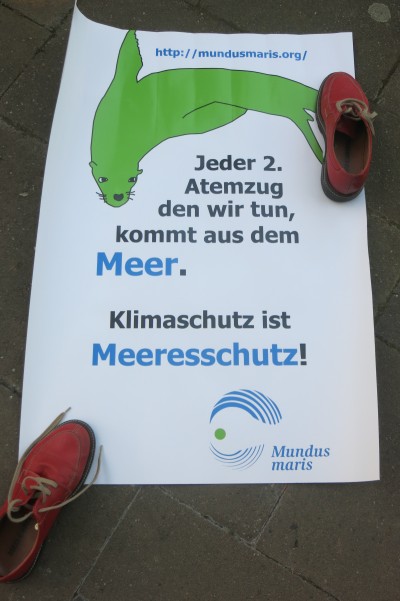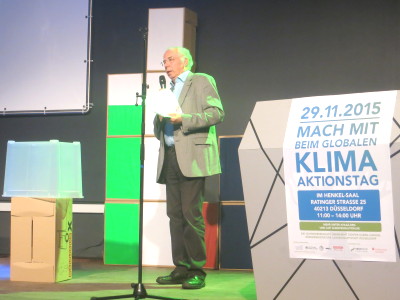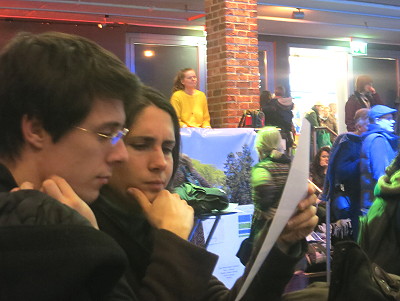Mundus maris ha partecipato all'evento a Duesseldorf
 Organizzato per iniziativa delle persone già al centro della marcia per il clima del 21 settembre, il gruppo di supporto e sponsorizzazione di questo anno è cresciuto in modo incoraggiante.
Organizzato per iniziativa delle persone già al centro della marcia per il clima del 21 settembre, il gruppo di supporto e sponsorizzazione di questo anno è cresciuto in modo incoraggiante.
Con Maik Willmes, Nick Goedeking, Mattes Liebsch e il prof. dr. Gößling, il nucleo organizzativo ha saputo ispirare gli altri alla partecipazione e al coinvolgimento.
Tra gli altri sponsor vi erano una società di promozione delle energie rinnovabili e del risparmio energetico elettrico, e la cassa di risparmio locale (Stadtsparkasse).
Günter Karen-Jungen, Sindaco verde di Düsseldorf, ha offerto il suo patrocinio.
L'evento nel quartiere Bohème della capitale della Renania ha associato moderazione, brevi discorsi informativi e molta musica dal vivo, con la signora Brightside e la sua banda, oltre che ampie possibilità di discussioni tra i partecipanti. Questo il programma dell'evento:
11:00 - Benvenuto del sindaco di Dusseldorf, capitale della Renania
11:15 - Musica dal vivo
11:30 - Prof. Claus Gößling: Che cosa è il cambiamento climatico. Note sul retroscena
11:45 - Musica dal vivo
11:50 - Mattes Liebsch: Presentazione del Piano dei 10 punti - cosa posso fare io stesso
12:05 - Musica dal vivo
12:15 - Nick Goedeking: Il cambiamento climatico - Informazioni di base sulla riunione ONU di Parigi
12:30 - Musica dal vivo
12:35 - Jörg Heynkes: Il ruolo delle piccole e medie imprese nel contrastare il cambiamento climatico
12:42 - Carmela Melstroem – Cosa possono fare le piccole imprese?
12:50 - Musica dal vivo
13:00 - Prof. Claus Gößling e Mattes Liebsch: il Piano dei 10 punti - altre considerazioni
13:15 - Musica dal vivo
13:20 - Discussione con gli esperti
13:55 - Note di chiusura
 Il sindaco Karen-Jungen ha accolto i partecipanti ed espresso l'impegno del consiglio cittadino ad incrementare le misure di contenimento del cambiamento climatico in tutta la pubblica amministrazione così come nel supportare le misure di risparmio energetico adottate dai cittadini e dalle imprese.
Il sindaco Karen-Jungen ha accolto i partecipanti ed espresso l'impegno del consiglio cittadino ad incrementare le misure di contenimento del cambiamento climatico in tutta la pubblica amministrazione così come nel supportare le misure di risparmio energetico adottate dai cittadini e dalle imprese.
La parte seguente è in corso di traduzione.
A lighthouse project was the new hyper-efficient electricity plant that provided central heating as well and was billed as currently the most advanced in the world.
But the city was also investing in climate proofing its car fleet, increasing energy efficiency of public buildings and promoted practical action by citizens as well.
The watchword was - nobody can do it alone, but everybody can do something.
Prof. Dr. C. Gößling followed up on this theme and explained the physical principles behind the greenhouse effect and its initally beneficial effects on our planet's climate.
Echoing the results of the last assessment report of the Intergovernmental Panel on Climate Change (IPCC) he noted that the each of the last three decades had increased average temperatures compared to the previous one.
The CO2 emission of an "average" German was a whopping 11 tons/year (some estimates are even as high as 12.5 tons). That includes emissions not provoked by the individual directly, but arising from different services and institutions, such as health care, the military, the industrial food system etc.
 The thinning of ice shields and melting of glaciers around the world. The warming ocean has increased sea levels in the last century by 19 cm, more than in the previous 2000 years.
The thinning of ice shields and melting of glaciers around the world. The warming ocean has increased sea levels in the last century by 19 cm, more than in the previous 2000 years.
We can measure current change compared to past states. It is difficult to predict the future. Therefore, scientists develop scenarios based on different types of behaviour of people, companies and entire societies.
Strong immediate efforts to stop further CO2 emissions offer hope to keep warming at the end of this century to about 2°C as proposed to the UN Climate Summit in Paris starting tomorrow. It is worth noting that African and island countries are militating for limiting the warming to 1.5°C as their existence is otherwise in jeopardy.
However, if business continues "as usual" - as still seems to be the case despite much talk - we are heading towards a world that will be 3 to 5°C warmer on average at the end of this century.
Nobody can predict with certainty how Earth will look like. The climate models available at the moment can not describe such a regime very well.
We do know, however, that only the one degree increase experienced so far has already led to more extreme weather events, lots of damage to people and infrastructure and that tropical animals such as corals already die en masse because their temperature tolerance is exhausted.
 Focusing on what can and must be done to prevent warming from running totally out of control, the organisers presented a 10-point-plan for immediate action.
Focusing on what can and must be done to prevent warming from running totally out of control, the organisers presented a 10-point-plan for immediate action.
The plan addresses the four big areas of average annual CO2 emissions by German citizens:
- mobility (2.4 tons)
- consumption and food (4.5 tons)
- electricity (0.8 tons)
- heating (1.8 tons).
Advice covers suggestions such as taking more bicycle rides instead of the car, avoid air travel if possible, reduce meat consumption, chose a utility providing electricity from renewable sources, abolish the stand-by mode of household appliances, and insulate your house or appartment.
Click here to download the 10-point-plan for immediate climate action (in German).
There was plenty of opportunity to get more information about how to put these and other measures into action. We heard from Jörg Heynkes of the Chamber of Commerce that losing or gaining money makes entrepreneurs sit up and listen to what consumers want in terms of climate friendly products and services.
A children's corner offered painting and tinkering and Mrs. Brigthside and her live band lifted the spirit with a wide spectrum of music.
Catch the atmosphere by clicking on the link to the video. Click here for more info on climate solutions. All pics on this page by Cornelia E Nauen.















